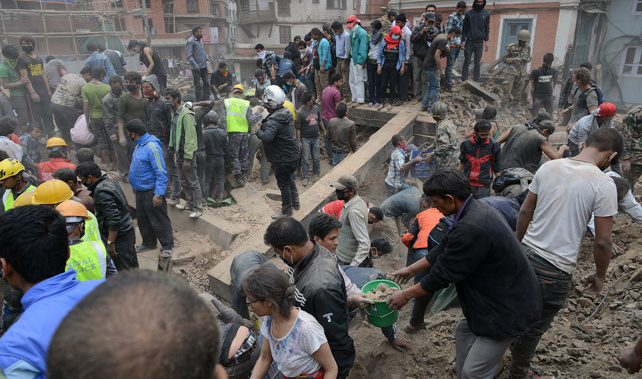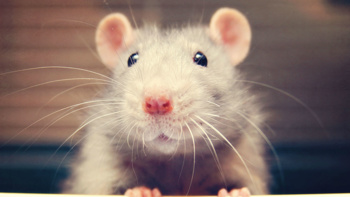
UPDATED 2.49PM: The official death toll in Nepal from a massive weekend earthquake has risen to 3,218, a disaster management chief says.
MORE: Nepal Quake - How you can help
PHOTOS: Carnage after Nepal earthquakes
"The death toll has reached 3,218 and over 6,500 are injured," said Rameshwor Dangal, who heads the home ministry's national disaster management division.
The toll for Nepal after the 7.8 magnitude earthquake had previously stood at 2,430.
Around 90 people are also known to have died in neighbouring countries, including India and China.
Meanwhile, a British climber stranded on Mount Everest says he fears it's a race against time for those awaiting rescue.
James Grieve, 52, told the Sun newspaper by satellite phone from Camp One, on the world's highest peak, that the rescue effort is being hampered by storms, and the party's supplies will last only a few more days.
Climbers have been cut off from the mountain's base camp, which is reported to have been devastated by the initial 7.8 magnitude quake and Sunday's large aftershock.
Nepal's mountaineering department says at least 18 people have been killed and 61 injured, while an unknown number is still missing.
Mr Grieve estimates up to 50 people had been killed and said there was a plan for helicopters to rescue them today although the choppers are only taking two people off at a time.
He said he believed it could be Wednesday when they would be brought to safety but warned of a forecast metre of snow which could set search teams back.
NZ sends USAR team to Nepal
A 37-strong urban search and rescue team will fly out to Nepal tonight to help in the rescue effort there.
The biggest of the recent aftershocks has come in at 6.7 on the Richter Scale - thousands of people have been made temporarily homeless out of fear. 30,000 people are currently living in makeshift shelters in 16 government camp locations.
The USAR team has recently become UN qualified to respond to these kind of disasters, and they'll be New Zealand's first boots on the ground in Kathmandu.
New Zealand Fire Service national commander Paul Baxter says it's a very chaotic environment, and there are still large aftershocks with a number of people unaccounted for.
Foreign Minister Murray McCully says the technical rescue experts will be supported by paramedics, a doctor, a structural engineer, logistics personnel, a command and control element, and a Ministry of Foreign Affairs and Trade liaison officer.
It's expected the team will be in Nepal for up to 14 days - though this is subject to change depending on how the operation goes.
More than 100 Kiwis are in Nepal and have been in touch with the Foreign Affairs Ministry, but some have yet to make contact. Murray McCully says there's nothing to indicate any have been killed or injured.
The Wanaka firm Adventure Consultants has a group at Camp One on Mt Everest, but they're all safe, but five Sherpas working for the company were killed in the avalanche with hit base camp.
Operations manager Caroline Blaikie says it's been particularly traumatic for those who were at Base Camp when the avalanche struck.
"It's always been something that people have feared and it's always been a when, not if, situation but I don't think anyone could have seen the absolute scale country-wide."
Supplies of medicines, medical equipment and shelter are running low in Nepal, and the NZ Government has made an initial commitment of $1 million to support aid agencies who are active on the ground in Nepal.
James McGoldrick of the United Nations says there's still very little power, and the airport has to close every time there's an aftershock.
"Hospitals have been swamped. Lots of people have been bought in with quite severe injuries and they don't have the material in some of these hospitals."
Oxfam's Cecilia Keizer says a lot of people are too scared to return to their homes.
"We still face a lot of aftershocks so people have to stay outside probably tonight as well."
"It's very difficult to reach the most affected areas...because there are no roads."
Red Cross worker Mark South thinks medical supplies and shelter are top of the list of priorities, as rescue and recovery efforts continue.
"There were many thousands of people who were spending their second night out on the tarpaulin again tonight. More shelter material is needed. It's hot during the day, people need shade, and unfortunately it's been raining for the last few hours."
UNICEF New Zealand's Vivien Maidaborn insists one big issue is the supply of safe drinking water.
"The water supply systems are down so within two or three days, there will be sanitation and hygiene challenges for that population."
Take your Radio, Podcasts and Music with you









